The College of Architecture and Design at Prince Sultan University has a sharp focus on national and global sustainability goals, with students and researchers embedding this in their work from inception to creation
The College of Architecture and Design at Prince Sultan University in Saudi Arabia is known for its forward-thinking faculty. The all-female college has more than 650 students and about 50 staff from a diverse range of nationalities.
Looking towards the Saudi Vision 2030 and the UN Sustainable Development Goals, sustainability is embedded in both the curriculum and research. “When you think about design, it doesn’t matter what scale you work at – whether that’s an interior, a building or even a city – if your design choice is not sustainable, it will not be successful,” says Fiorella Vanini, assistant professor of architecture at the college.
The college brings together the disciplines of architecture and interior design. Students are encouraged to think about sustainability before they even begin projects, and to apply LEED (leadership in energy and environmental design) scores to their designs to gauge how green their finished project will be. This forces them to think about everything from the materials used in construction to how a building might help its inhabitants save money or energy.
In their research, academics are encouraged to think about four key themes for papers: design for well-being, design for cultural heritage, urban interior design and sustainable design. “We always push faculty to be up to date with the latest developments in the market,” Vanini adds.
The past two years have seen guest lectures from well-known architecture studios such as Schiattarella Associati and the firm behind the famous mirrored Maraya concert hall in the AlUla Valley. “We also support the United Nations’ SDG of gender equality by bringing in female speakers who are successful practitioners in their field, sharing their experiences of working in a male-dominated environment,” Vanini says.
Broadening awareness of sustainability issues beyond the campus is equally important. The college recently participated in the Saudi Design Festival, where students exhibited projects showcasing environmentally friendly building elements such as green walls for cooling and rainwater harvesting.
“We also invite anyone interested in sustainability to collaborate with us, for example the Italian Embassy,” explains Samaher Fallatah, assistant professor of interior design at the university. “This could be someone coming in as a guest speaker to inform students about ideas or products they have already implemented, and that could inspire them.”
In 2019, PSU hosted the Saudi Green Building Forum and lecture series, where LEED certifications were distributed to participants to recognise their sustainability credentials.
The latest addition to the college is its sustainable architecture lab, which opened its doors in June 2021. The lab aims to bring together interdisciplinary, design-led research, coming up with solutions to challenges that impact the environment in Saudi Arabia and beyond.
This will focus on human-centred design and look at key indicators such as energy efficiency, as well as questions such as how buildings can improve quality of life through improved levels of comfort and the sociocultural impact of architecture.
The upcoming International Conference on Sustainability, Developments and Innovations, held in conjunction with PSU’s College of Engineering, will take this focus further through themes such as sustainability in manufacturing, construction materials energy and smart cities.
See original post at Times Higher Education Website

